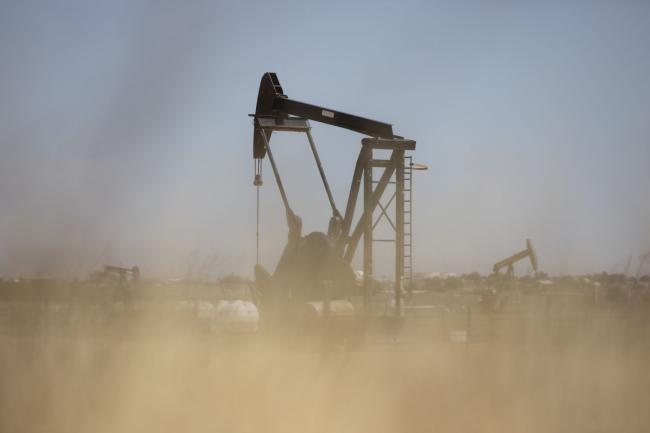(Bloomberg) -- The Federal Reserve revamped its Main Street Lending Program in ways that will allow battered oil companies to qualify for the aid after industry allies lobbied the Trump administration for changes.
Larger, more heavily indebted companies can now qualify and use the money to pay off prior loans under the changes the central bank announced Thursday.
The move opens the door to more oil and gas producers, said Senator Kevin Cramer, a Republican from North Dakota, who had pressed the administration on the issue as energy companies struggle to survive an epic collapse in fuel demand and crude prices.
“With the decrease in demand and oversupply due to the global oil price war creating a valley for these highly leveraged companies, this expansion will help them bridge the gap as we look to reopen America,” Cramer said in an emailed statement Thursday.
Environmentalists blasted the shifts they said rewarded oil companies that took on too much debt and were overproducing crude even before the coronavirus pandemic caused demand to plunge.
“These changes directly reflect demands from polluters and their favorite members of Congress,” said Lukas Ross with the environmental group Friends of the Earth. “Long before the coronavirus, the drillers were in deep trouble. Now frackers want to pay back their debts with our money. Trump’s big oil bailout must be stopped.”
For weeks, oil industry advocates have warned the original program structure would prevent beleaguered drillers from accessing capital under the program.
Senator Ted Cruz, a Texas Republican, and the Independent Petroleum Association of America argued oil companies needed more flexibility to use Main Street loans to repay existing debt -- something that was previously off limits but will now be allowed under some conditions.
Maximum loan totals under the Main Street program are also being hiked to $200 million -- from an earlier $150 million cap viewed as too low to help oil producers.
“Great news out of the Fed today in support of struggling U.S. energy companies,” Energy Secretary Dan Brouillette said in a tweet Thursday. He added that he would “continue” his work with Treasury Secretary Steven Mnuchin to provide “other relief” to the industry.
The Fed said the changes were not targeted to the oil and gas industry or any industry in particular but followed additional research into what slice of U.S. companies don’t have ready access to capital markets.
Nevertheless, the new terms are likely to open it up to a wider group of energy firms, and overseers worried the Fed was bending to pressure.
“The major changes announced today mirror the top requests of the oil and gas industry,” said Bharat Ramamurti, a member of the congressional panel appointed to scrutinize implementation of the Fed’s and part of the Treasury’s virus-relief programs.
“That raises questions about how the changes promote the broader public interest -- especially when these companies will still have no real obligation to retain or rehire their workers,” Ramamurti said on Twitter.
Credit Ratings
Even before the changes, oil and gas companies with investment-grade credit ratings could secure funding through a separate program, the Fed’s Primary and Secondary Market Corporate Credit Facilities.
However, under term sheets released April 9, funding was restricted to firms that had credit ratings of at least BBB-/Baa3 as of March 22 -- a cutoff date that could come too late for some oil producers, such as Occidental Petroleum Corp (NYSE:OXY)., which had its debt cut to junk by Moody’s on March 18, with Fitch and S&P following on March 20 and March 25, respectively.
Republicans have argued that funding should be available to oil companies with credit ratings that slipped amid the coronavirus pandemic and a surge in crude unleashed by a Russia-Saudi Arabia battle for market share.
On Thursday, the Fed said lenders now will be able to apply their “industry-specific expertise and underwriting standards to best measure a borrower’s income.”
Highly leveraged companies also can take advantage of a new, third loan option that comes with increased risk sharing by lenders.
It was not clear Thursday whether the changes would allow Occidental to qualify for aid -- or whether potentially newly eligible oil companies would seek it. Occidental declined to comment on the matter.
The Fed’s approach to tweaking the Main Street loan program avoids creating an oil industry-specific initiative that could be unpopular with the public or require approval from Congress, where Democrats are deeply opposed.
Fed emergency facilities are by law required to be broad-based, which in the central bank’s view prohibits lending aid to specific industries.
The oil industry itself has been split over government aid targeted to the sector. While some smaller, independent producers and their trade groups have clamored for government loans, the idea of industry-targeted aid has drawn resistance from larger, multinational oil companies better able to ride the rout as well as their top lobbying group, the American Petroleum Institute.
Industry opponents of targeted loans are concerned that taking taxpayer money now could cost them political capital in Washington and be used by drilling foes against the sector later.
“You can’t have capitalism on the way up and socialism on the way down,” said American Petroleum Institute Senior Vice President Frank Macchiarola. “The role of the government is to provide appropriate economic stabilization across the economy. We do not think the role of the government is to become the private economy.”
(Corrects spelling in final paragraph)
©2020 Bloomberg L.P.
